To improve your digestion and gut health, consider incorporating specific foods into your diet. Ginger can help with nausea and speed up gastric emptying. Fiber-rich foods like whole grains, fruits, and vegetables can aid in keeping things moving smoothly. Probiotic and fermented foods, such as yogurt and kimchi, can help support a healthy gut microbiome. Whole grains also promote the growth of beneficial bacteria. Prebiotic foods, such as onions and bananas, can nourish those good bacteria and support your immune system. Additionally, peppermint can relax your GI tract, reducing pain and bloating. Interested in learning more about these gut-friendly foods?
Key Takeaways
- Ginger boosts digestion and alleviates issues like nausea and bloating.
- Fiber-rich foods like whole grains, fruits, and vegetables enhance digestive health.
- Probiotic and fermented foods support a healthy gut microbiome and improve nutrient absorption.
- Prebiotic foods such as onions, garlic, and bananas nourish beneficial gut bacteria.
- Peppermint tea relaxes GI tract muscles, reducing abdominal pain and promoting smoother digestion.
Ginger
Ever wondered how ginger can boost your digestion?
This zesty root isn't just for your sushi! Ginger, packed with anti-inflammatory and antioxidant properties, is a gut health superhero.
It's been a staple in traditional medicine for ages, helping to alleviate digestive issues like nausea, indigestion, and bloating.
Ginger also speeds up gastric emptying, making your food move faster through your system. Imagine it as your gut's personal traffic cop, ensuring no food traffic jams.
To aid digestion, sprinkle ginger in your smoothies, teas, stir-fries, or as a seasoning. With its spicy kick, your gut will thank you!
Fiber-rich Foods
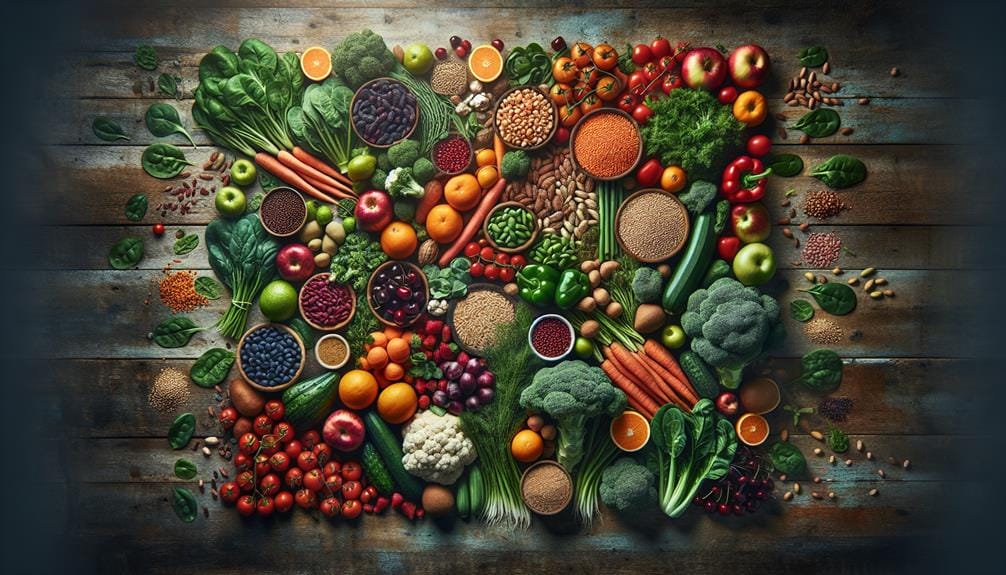
While ginger works wonders for your gut, incorporating fiber-rich foods like whole grains, fruits, and vegetables can further enhance your digestive health.
Think of fiber as your gut's personal cheerleader, keeping things moving and grooving. Whole grains include oats, quinoa, and brown rice—seriously, they're like the superheroes of the fiber world.
Fruits and vegetables, such as apples and broccoli, provide essential roughage that keeps your bowel happy. Don't forget nuts and seeds, which add a crunchy twist to your diet while supporting a good gut.
Aim for 25-30 grams of fiber daily, and you'll have a healthy gut that's ready to tackle anything. Just remember, fiber is like a VIP pass to a smooth digestive ride!
Probiotic and Fermented Foods
Incorporating probiotic and fermented foods like yogurt, sauerkraut, kefir, and kimchi into your diet can greatly enhance your digestion.
These foods contain beneficial bacteria that support a healthy gut microbiome, which helps alleviate issues such as bloating and gas.
Benefits of Probiotics
Probiotic foods like yogurt and kimchi boost your gut health by introducing beneficial bacteria.
Think of probiotics as the superheroes of your gut microbiome.
These fermented foods help with digestive health, making nutrient absorption a breeze.
If you're lactose intolerant, don't worry—probiotics can help break down lactose, turning your belly's tantrums into peaceful protests.
Consuming a mix of these foods means you're inviting diverse gut microbiota to throw a party in your intestines, keeping everything balanced and happy.
Common Fermented Foods
Now, let's explore some common fermented foods that can elevate your digestive health.
You might think sauerkraut is just for hot dogs, but it's a probiotic powerhouse! Along with yogurt, kefir, kombucha, miso, and kimchi, it supports a healthy gut microbiome.
These fermented foods help with digestion and can relieve those pesky digestive issues like bloating and discomfort.
Incorporating Into Diet
Adding probiotic and fermented foods to your meals is a simple way to boost your digestive health. Imagine your gut bacteria throwing a party every time you eat kefir, kombucha, or sauerkraut! These foods are packed with probiotics that help keep your gut flora balanced, aiding in nutrient absorption and overall digestive health.
If you're lactose intolerant, don't fret—there are plenty of lactose-free options like certain yogurts that still pack a probiotic punch. Plus, the fiber in these foods helps everything move smoothly (if you catch my drift).
Whole Grains
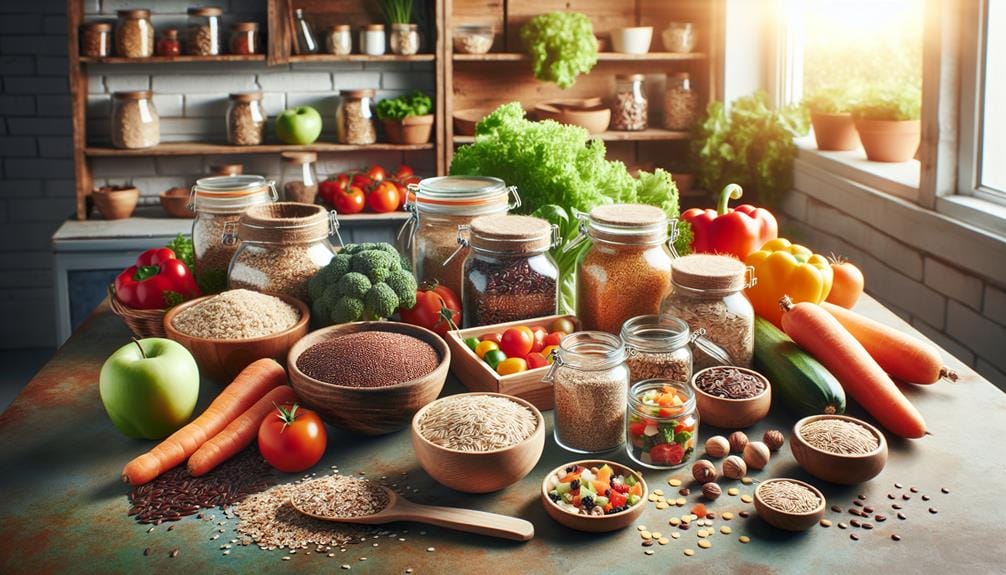
When you choose whole grains like brown rice and whole wheat bread, you're giving your digestive system a boost with their rich fiber content.
This fiber helps keep your colon functioning well and promotes the growth of beneficial gut bacteria.
Replacing refined carbs with whole grains can improve bowel regularity and contribute to overall digestive health.
Fiber-Rich Options
Whole grains like brown rice and quinoa are packed with fiber, making them excellent choices for improving digestion and promoting regular bowel movements. These fiber-rich foods are your gut's best friends, helping you avoid those awkward moments when you can't go.
Oats and barley boast soluble fiber, aiding in nutrient absorption and boosting your gut health. And let's not forget whole grain bread and pasta—they're not just delicious but also provide sustained energy and improve gut function.
Benefits of Whole Grains
Incorporating whole grains into your diet boosts your digestive health by providing essential fiber and nutrients. Whole grains like brown rice and whole wheat bread are fiber-packed powerhouses that keep things moving, if you know what I mean.
The fiber supports the growth of beneficial gut bacteria, enhancing your gut microbiome. Plus, the omega-3 fatty acids in whole grains contribute to overall digestive wellness.
Here's why you should make friends with whole grains:
- Constipation prevention: Fiber in whole grains helps keep your colon function running smoothly.
- Gut bacteria love them: Whole grains support a diverse gut microbiome.
- Nutrient-rich: They provide essential nutrients, including omega-3 fatty acids.
Daily Intake Recommendations
Understanding the appropriate amount of whole grains to include in your diet can greatly enhance your digestive health. Let's face it, nobody wants a grumpy gut!
Aim for at least three servings of whole grains daily. For women, that's around 48 grams, and for men, it's about 64 grams.
A variety is key—mix it up with quinoa, brown rice, whole wheat bread, and oats. These whole grains are packed with essential fiber and vitamins, making them your digestive system's best friends.
Plus, they help maintain a balanced and diverse gut microbiome. So, next time you're at the grocery store, remember: whole grains aren't just a sidekick, they're the main event for a happier, healthier you.
Prebiotic Foods
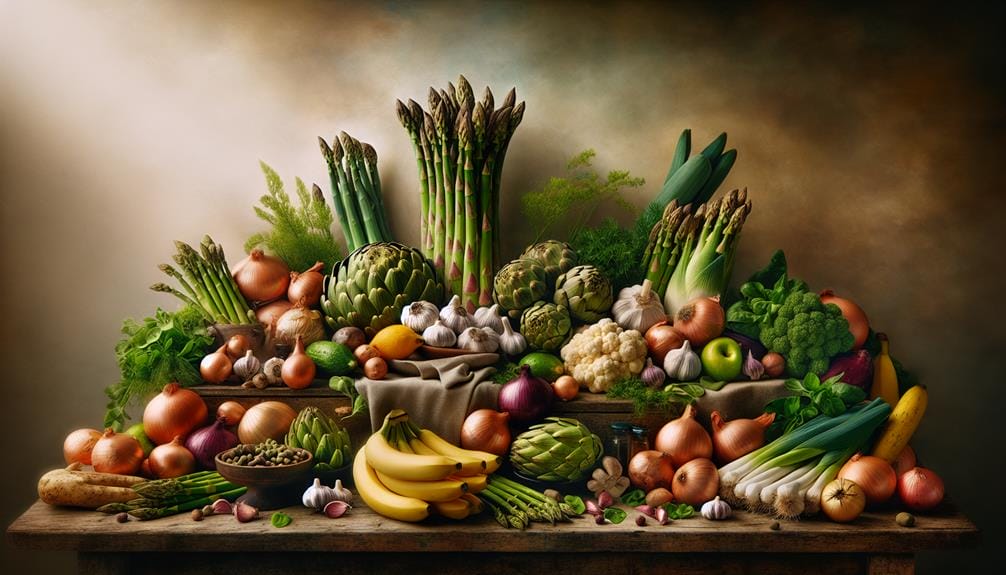
Prebiotic foods like onions, garlic, leeks, and bananas play an essential role in nourishing beneficial gut bacteria. These non-digestible fibers are like a buffet for your gut's good guys, helping improve digestion and overall gut health. Plus, they support your immune system by enhancing microbiome diversity and aiding nutrient absorption.
So, it's not just your taste buds that benefit; your whole body gets a boost!
Here's how you can jazz up your diet with prebiotic foods:
- Onions and garlic: Throw them into sauces, soups, and salads for a flavorful punch.
- Leeks: Perfect for adding to stews or roasting as a side dish.
- Bananas: Enjoy them as a snack or blend into smoothies.
Your gut will thank you!
Peppermint

After nourishing your gut with prebiotic foods, don't overlook the power of peppermint to further aid digestion and alleviate discomfort.
Peppermint, the superstar of the digestive world, is here to save your tummy from bloating, discomfort, and that pesky indigestion. Packed with menthol, it relaxes GI tract muscles, promoting smoother digestion and faster gastric emptying.
For those battling IBS, peppermint oil capsules can reduce abdominal pain and bloating with the flair of a magician pulling a rabbit from a hat.
Prefer sipping over popping pills? Peppermint tea is your go-to remedy for soothing the digestive system.
Conclusion
Just like a well-tended garden flourishes, your gut thrives when you nourish it with the right foods. Incorporating ginger, fiber-rich foods, probiotics, whole grains, prebiotics, and peppermint into your diet can greatly enhance digestion and gut health.
Think of these foods as the essential tools to cultivate a balanced, healthy digestive system. By making these choices, you're laying down the roots for long-term well-being, ensuring your internal ecosystem remains robust and efficient.
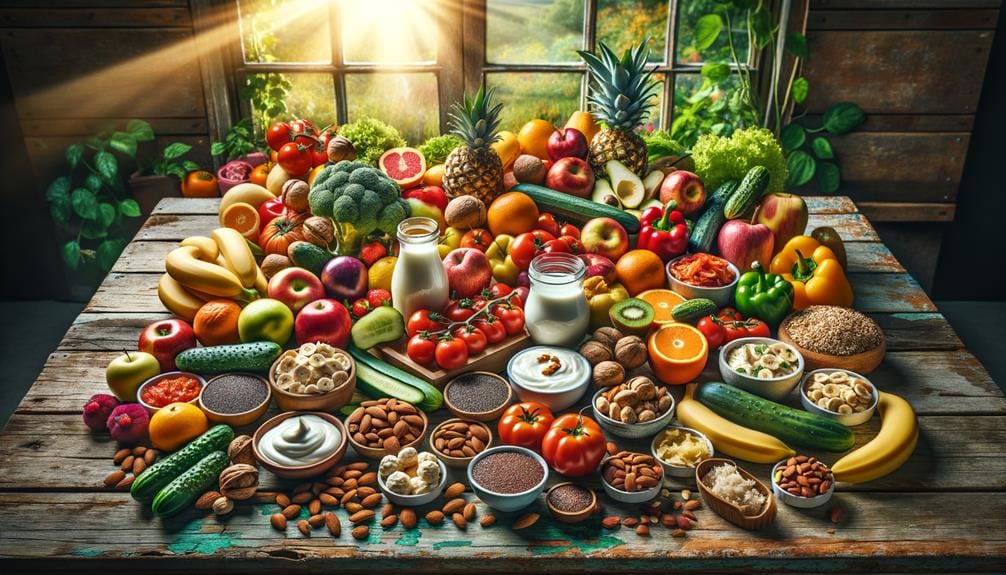


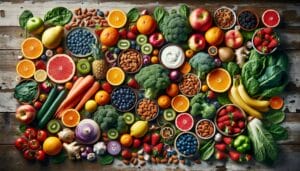

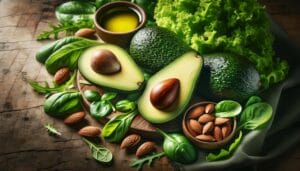



Leave a Comment